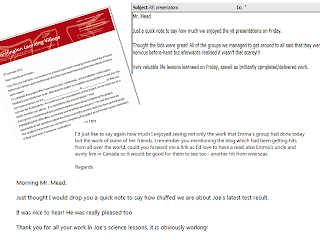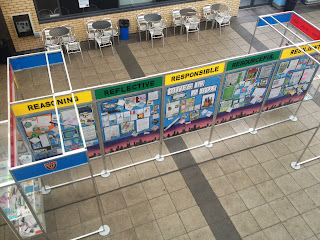For the Physics of the Olympic Project we invited the students parent in during the science lesson. It was interesting to note that even this one off event has had a lasting impact. The sessions themselves where great, all the students were excited and bristled with "lets get this job done", even those whose parents couldn't make it. You could cut the tension in the air when the group of 30 adults entered the room ( four classes). A quick presentation was made to set the context pointing out the relevance of doing projects. Reading out 6 job adverts from the current New Scientist each one mentioning the word projects did that. Finally pointing out keywords and ideas to look for. I also encouraged them to visit as many projects as possible, which I don't believe was necessary as the parents were tremendous and were a cordial yet challenging audience. I was thrilled to stand next to some parents who "grilled" their son on the physics. He returned in kind with detailed. logical and correct answers. It was a great buzz to see this all going on The students shared their drafts, the classwork and the journeys they had been on, some knew they had let themselves down while some beamed with pride. Many a parent thanked me on the way out and some even pondered why this was not a regular event. It will be and we have one imminent in year 7.
I must admit, I'd much rather do this twice a year, than to fill in some numbers about my students "progress", or sit and have a conversation about the numbers at parents evenings, or to write a report. Exhibition makes the progress or lack of it concrete for everyone. We can see the effort that was made, in fact we are showing an appreciation of the effort the student made, we can identify and share what needs to happen next. It stimulates real conversations about real learning. Along side the project , the drafts, and student reflections my students had their exam papers on display. They could show their parents that they had learned successfully in many different ways. If we want evidence to inform education, then this is a great way to show it.
"You cannot separate character and scholarship. There is a direct correlation." Ron Berger.
Remember it is worth the effort.
Putting on an exhibition is an arduous task, and can seem risky. What if it goes wrong? However, even if the projects aren't great then it doesn't prevent the exhibition. This is part of the project, students will learn.
My favourite anecdote from my trip to High Tech High exemplifies this value.. A student on an exhibition night was there without a finished project, amongst a whole class of projects . This void, really stood out, I asked her where her project was and was confidently told that she had been let down by her partner, but that she had everything in hand to meet the deadline later in the week to hand over the project to the recipient. As we spoke a colleague came by and interjected, " I'm sorry" he said "but where's your project" , this was followed by another colleague three minutes later asking the exact same thing. So in about 10 minutes three strangers had asked this student why she had not finished her project, this is real assessment, with real feedback, leading to real responsibility. . Two things struck me about this student was how confident she was in failure and how much she had learned about the content and process of completing this project, in reality she had been really rather successful. I have since witnessed this exact event with my own students.
I would also suggest that the impact is long lasting. I can give two strong anecdotes, where the students have been "transformed" by their experience. I am sure that most of my students will to alesser extent show these kinds of attitude and motivation changes. I honestly believe that the culture and the skills of projects is transferable.
Student number one: Year 7 Most tests and written assignments below target. Five home works in a row in complete. i.e. Unmotivated. Year 8 ALL test and written assignments on or Above target. Homework always done.
Student Number two: Bright, intelligent boy. i.e. Lazy. always just about on target, but rarely on. Now, always at least on, often above. Highly motivated and believes he can do it.
These are not testament to me, but to the culture, and structures that projects bring with them.
So I encourage you to take the "risk" and make the effort of exhibiting. It is indeed worthy.
Expert audience raises student expectations.
Seems obvious, but these bring their expertise. This allows them to challenge students from an authoritative position. The Where should we Bee project involved getting critique from the good people at the Bee conservation Trust, and the final exhibition will have local bee keepers. Their interest and knowledge are valuable for our students, not only in motivating them to be prepared, but also from what they can add during conversations.
Does your project have a legacy.
Some of my first attempts of Projects, had very short lived exhibitions. A single day or event. When considered in these terms, you must question if the huge effort required to complete a project is worth it? So carefully considering where and how your final product is displayed is an important consideration.
Following the Cities in a Box project, we invested in a large central display case for our project work. Designed and constructed by Nick MacGregor. This video clip really captures the excitement its initial launch had. The great thing is, that this display is permanent, we can go and scrutinise it and use it as a model of high quality work .
This display also captures the process of how the students produced such quality, highlighting drafting and critique. The display captures "our ethic of excellence". Students still point at and talk about the display at breaktime and lunch. Therefore it could be considered to permeate the culture of our school, even at lunch high quality work is prominent. They are showing they are proud of their work, and why wouldn't they be?
Presentations of learning.
Do not just present the product, the process of how the students got there is also a vital ingredient to great exhibition. One of my proudest moments in teaching came from doing just this. A student who was very shy, awkward in his interactions with others, stood up in front of his parents, peers and adults he did not know and started his Presentation with the line " At the start of this project I was not very confident...". I have to admit, I was completely taken aback, emotional even. This simple sentence reveals so much, he is now confident enough to recognise his weaknesses publicly. This is gutsy, clever and a great way to advocate Project Based Learning. I wish I had recorded this presentation. Next time, next time.
Be aware, that good Presentations of Learning don't just happen and are not a tag onto the end of the project, they are planned from the start. The reflection and debriefing sessions that occur throughout the project should help the students gather evidence to use in them. This leads to my final point.
Curate the project process.
Curate sound awful grand, but it's definition
"Select, organise, and look after the items in (a collection or exhibition)"
is exactly what is needed to support students, allowing them to be metacognitive about the work that they are doing.
I use the ABC method to curating. I establish a blog that mainly focuses on the processes that the students have used or have been put in place to facilitate their project. In a way this is content "lite" as the product itself should encompass the content being learned. This has had the benefit of attracting an audience for the project. Students find this interest in their work highly motivating. It makes it clear to them that they are not doing the work for Sir, but that their community is interested in what they learn.
I tend to ask a range of different reflection questions, which combines content, process, success and next step prompts. The nature of projects and exhibition can be summarised in a the following image. If this was a visit to an art gallery, your response would be despite the appearance of a masterpiece, your opinion of the gallery would that it was "pants". In reality we what all student work to be a masterpiece. The ONLY way to achieve this is through critique, and critique needs a strong trusting community. So debriefing, and reinforcing the behaviours that we want are also an essential part of this. I have found these questions really helpful in this. My particular favourite is "tell me about when someone said Thank you?", it always induces a whole host of "thanks for..." conversations. False, as they start out, but it also makes it a normal thing to do.
However, I only select one or two per written reflection and ask students to write more. This is combined with verbal debriefs which are also curated, using AudioBoo or Sound Cloud. I often get them to electronically record it so I can simply copy and paste, and then highlight key points on the project blog.
Another great idea from High Tech High, Search through "heaps" of these in their Unboxed Journal.
The premise is simple.
- take some high quality images of the project.
- Write a pithy summary of what the project was.
- Write your reflections ( teacher)
- Add in students perspectives.
- Share.







No comments:
Post a Comment